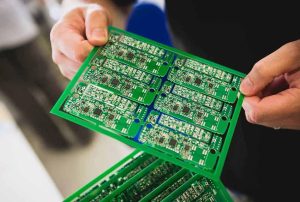Introduction The Global Printed Circuit Board (PCB) Market was valued at USD 78.33 billion in 2024 and is projected to reach USD 121.72 billion by 2033, growing at a CAGR of 5.02% over the forecast period. The market is being propelled by rising demand across consumer electronics, automotive, healthcare, and industrial automation, coupled with advancements
Introduction
The Global Printed Circuit Board (PCB) Market was valued at USD 78.33 billion in 2024 and is projected to reach USD 121.72 billion by 2033, growing at a CAGR of 5.02% over the forecast period. The market is being propelled by rising demand across consumer electronics, automotive, healthcare, and industrial automation, coupled with advancements in miniaturization, high-speed communication, and 5G technologies.
Request a free sample copy of the report: https://www.renub.com/request-sample-page.php?gturl=printed-circuit-board-market-p.php
PCBs are critical for modern electronics, serving as the foundation that integrates chips, resistors, capacitors, and other components into a functional system. Their increasing complexity, adaptability, and essential role in high-performance devices make them indispensable across industries.
Market Overview
A Printed Circuit Board (PCB) is a flat board that holds electronic parts and connects them with tiny metal paths called tracks and pads. PCBs are found in almost every modern gadget—from smartphones, laptops, and TVs to car electronics, factory machines, airplanes, and medical tools.
As more devices like smart watches, 5G networks, and electric cars are being used, the need for smaller, more complex, and multi-layer PCBs has grown. These boards can fit many electronic parts in a small space, helping new ideas and inventions in gadgets, factories, healthcare, and cars.
Key Drivers of PCB Market Growth
1. Emergence of 5G and High-Speed Communication
- The rollout of 5G networks is creating a big need for fast and multilayer PCBs.
- PCBs are used in telecom equipment, like base stations and small cells, to handle faster data and bigger bandwidth.
- As telecom networks are upgraded worldwide, PCBs are being improved for better signal, heat management, and smaller sizes.
2. Electrification of Vehicles and EV Adoption
- Electric vehicles (EVs) and self-driving car technology are changing car electronics.
- EVs use PCBs for battery management, power systems, inverters, infotainment, and driver-assist features.
- Cars now need complex, multilayer, and high-density boards to keep up with safety and connectivity needs.
- Eco-friendly rules and regulations are also increasing the demand for PCBs in vehicles.
3. Expansion of IoT, Wearables, and Consumer Electronics
- The growth of IoT devices, smart home products, wearables, and new electronics is increasing the need for small and dense PCBs.
- Gadgets like smartwatches, fitness trackers, and smart speakers need high-density, rigid-flex, and tiny PCBs.
- People want lightweight, connected, and high-performance devices, which keeps driving PCB growth.
Market Challenges
1. Raw Material Price Volatility
PCB production depends heavily on copper, epoxy resins, and specialty laminates.
- Fluctuating raw material prices due to geopolitical tensions, supply chain constraints, or tariffs can increase production costs.
- Manufacturers must absorb margin losses or raise prices, affecting customer relationships and market competitiveness.
2. Intense Competition and Margin Pressure
The PCB industry, particularly in Asia, is highly competitive.
- Low-cost producers from China, Taiwan, and South Korea dominate with high-volume, low-margin products.
- Differentiation through advanced HDI, rigid-flex, and high-frequency boards requires significant capital investment, limiting smaller players.
- Price-sensitive markets exacerbate profit margin pressures, emphasizing the need for innovation and quality differentiation.
PCB Applications by Sector

Image by: Yandex.com
1. Consumer Electronics
- Consumer electronics use the most PCBs.
- Gadgets like smartphones, laptops, tablets, smartwatches, AR/VR devices, and foldable phones need high-density and flexible PCBs to save space and work better.
- Fast product updates and global digital growth are making PCBs more advanced.
Asia-Pacific, especially China, India, and South Korea, produces a large number of PCBs for brands worldwide.
2. Industrial and Automation Equipment
- Factories and smart machines need strong and reliable PCBs that can work in tough conditions.
- PCBs are important for robots, control systems, power converters, and IoT-connected machines.
- Special materials and coatings help PCBs handle heat and last a long time.
The adoption of Industry 4.0 is creating steady growth for industrial PCBs.
3. Medical Devices
- Healthcare electronics are a fast-growing area for PCBs.
- PCBs are used in wearable ECG monitors, implantable devices, imaging machines, and surgical tools.
- They must be small, safe for the body, and highly reliable.
Aging populations and more digital healthcare in North America, Europe, and Asia-Pacific are increasing PCB demand.
Regional Market Insights
1. United States
- Focus on innovation, high-complexity, low-volume production.
- Driven by aerospace, defense, medical devices, EVs, and 5G infrastructure.
- Government initiatives such as the CHIPS Act support domestic PCB manufacturing.
- June 2024: AdvancedPCB launched, integrating Advanced Printed Circuit Technology (APCT), Advanced Circuits, Inc. (ACI), and San Diego PCB Design (SDPCB) to enhance U.S. PCB capabilities.
2. Germany
- Strong demand in automotive, industrial automation, and precision medical equipment.
- Industry 4.0 and smart factories drive need for high-quality, multilayer, and high-frequency PCBs.
- April 2024: Thales Group expanded PCB production to support rail and industrial automation, highlighting PCB importance in infrastructure modernization.
Get Customization in the Report: https://www.renub.com/request-customization-page.php?gturl=printed-circuit-board-market-p.php
3. China
- Leads global PCB production with over 50% market share.
- Regions like Shenzhen and Suzhou host large PCB manufacturers for consumer electronics, telecommunications, automotive, and LED lighting.
- Government support for 5G, AI, and EVs encourages shift to high-tech HDI and flex PCBs.
- Oct 2024: WUS Printed Circuit announced CNY4.3 billion investment to expand computing-focused PCB production.
4. Saudi Arabia
- PCB market is nascent but expanding with electronics, renewable energy, defense, and smart city investments under Vision 2030.
- NEOM and other smart city initiatives increase demand for advanced PCBs, although domestic manufacturing and skilled talent remain limited.
- Sep 2024: Meituan entered Saudi Arabia, demonstrating global electronics and IoT investment potential.
PCB Market Segmentation
By Type: Single-Sided, Double-Sided, Multi-Layer, HDI
By Substrate: Rigid, Flexible, Rigid-Flex
By End Use: Industrial Electronics, Healthcare, Aerospace & Defense, Automotive, IT & Telecom, Consumer Electronics, Others
By Region: North America, Europe, Asia Pacific, Latin America, Middle East & Africa
Key PCB Manufacturers
- Advanced Circuits Inc.
- Zhen Ding Technology Holding Limited
- Unimicron Technology Corporation
- Würth Elektronik GmbH & Co. KG
- Becker & Müller Circuit Printing GmbH
- Jabil Inc.
- Murrietta Circuits
- Nippon Mektron Ltd.
- Sumitomo Corporation
- TTM Technologies Inc.
All companies have been analyzed on: Overview, Key Personnel, Recent Developments, SWOT Analysis, Revenue Analysis, and Key Players Analysis.
Future Outlook
The global PCB market is set to grow steadily as 5G adoption, EV production, IoT proliferation, and healthcare digitization accelerate.
- Emerging regions like Asia-Pacific and the Middle East will continue to drive volume demand.
- Innovation in HDI, rigid-flex, and high-frequency boards ensures technological leadership.
- Sustainability, supply chain resilience, and strategic collaborations will be critical for long-term competitiveness.
About the Company
Renub Research is a Market Research and Consulting Company with more than 15 years of experience in international Business-to-Business Researches, Surveys, and Consulting. We provide a wide range of business research solutions that help companies make better business decisions.
We partner with clients across sectors including Healthcare, Travel & Tourism, Food & Beverages, Power & Energy, Information Technology, Telecom & Internet, Chemicals, Logistics, Automotive, Consumer Goods, Retail, Building & Construction, and Agriculture to identify high-value opportunities, address critical challenges, and transform businesses.
Our core team consists of professionals with graduate, postgraduate, and Ph.D. degrees in Finance, Marketing, Human Resource, Biotechnology, Medicine, IT, Environmental Science, and more.
Contact Us:
Company Name: Renub Research
Contact Person: Rajat Gupta
Phone No: (D) +91-120-421-9822 (IND)
Email: rajat@renub.com
















